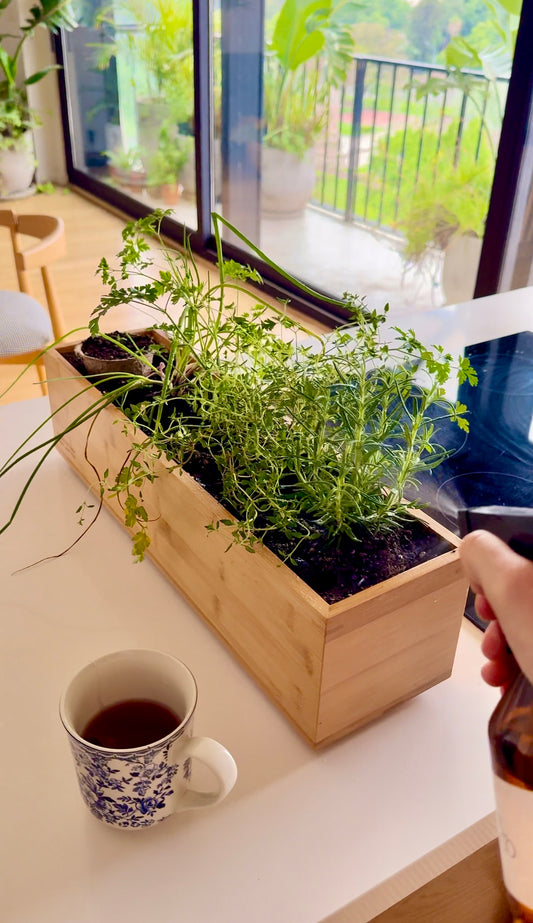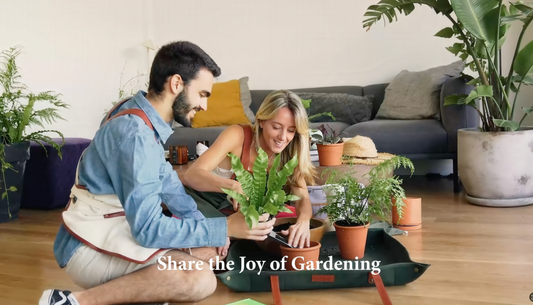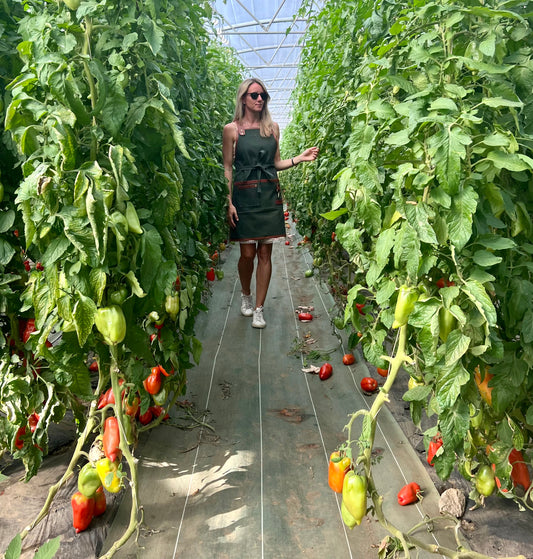There are many benefits to growing your own culinary herbs. Not only is it a great way to get fresh, delicious herbs for your cooking, but it's also good for the environment and your health! In this blog post, we will discuss the benefits of growing culinary herbs from seeds and provide some tips on how to get started.
The Benefits to grow your own herb garden:
One of the great things about growing your own herbs is that you can control what goes into them. You know exactly what pesticides and herbicides have been used, if any, and you can be sure that they are organic and sustainable.
Growing your herb gardens is environmentally friendly:
Growing your own herbs also allows you to cut down on food waste. When you buy herbs from the grocery store, you often have to buy more than you need and end up throwing away the unused portion. But when you grow your own herbs, you can take what you need and not worry about wasting any food
Eat Healthy:
Not only is growing your own herbs good for the environment, but it's also good for your health! Herbs are packed with antioxidants and other nutrients that can boost your immune system, improve your digestion, and even help you lose weight. And, of course, they taste great!
Make a new family hobby:Growing your own herbs is a great way to get the family together and enjoy some quality time outdoors. Plus, gardening is a great way to teach kids about where their food comes from and how it's grown. So, if you're looking for a new family hobby, consider planting your own herb garden. You'll be amazed at how much fun you'll have - and how much money you'll save!
Save money in your grocery bill:if you're looking for a way to save money on your grocery bill, planting your own herbs at home is a great way to do it.
Happiness to see them growNot only will you have fresh herbs at your fingertips, but you'll also get the satisfaction of knowing that you grew them yourself.
Make your own food:Another great benefit of growing your own herbs is that you can use them to make your own food. Homemade herbal teas, soups, sauces, and seasonings are all easy to make and taste great.


Fleur Du Bien's Cooking classes with Nora Borlasca. These classes they used Cilantro and Mint from Fleur Du Bien's herb garden seed starter kit (Once a week there is a new cooking class with great recipes to use your herb kit)
All You Need to Know To Grow Your Herbs Strong and Tasty:
How to start your own herb garden:
If you're interested in growing your own herbs, there are a few things you'll need to get started. Growing your own herbs can be a fun and rewarding experience, and it doesn't have to be difficult, you don't need to have a green thumb or being experienced gardeners.
Choose the right location:
Herbs need plenty of sunlight, so choose a spot in your house that gets lots of natural light. A south-facing window is ideal. If you do not have a spot in your home that gets enough sunlight, you can also grow herbs indoors under grow lights.
Any garden, no matter how small, is a great way to get some fresh air and enjoy the outdoors. But if you don't have a lot of space, or if you want to grow herbs year-round, then an indoor herb garden kit is a great option. The first step is to choose the right herb seeds for your garden.
The best culinary herb seeds to grow for your indoor herb garden:
One of the most popular herbs for indoor gardening is basil. It's easy to grow basil and can be used in a variety of dishes. Another good option is oregano. It's perfect for seasoning meats and vegetables, and it also has a lovely fragrance. If you're looking for something a bit different, try growing cilantro. It's an essential ingredient in many Asian and Latin American dishes. Rosemary is also a versatile herb that can be used in a variety of recipes, from chicken and fish to potatoes and vegetables. Lastly, don't forget about thyme - it's perfect for flavoring soups, stews, and sauces. So those are the best culinary herb seeds to plant indoors - basil, cilantro, rosemary, and thyme. With these herbs on hand, you'll be able to whip up all sorts of delicious dishes!

Pick the right Seeds supplier:
No matter what type of herbs you decide to grow, make sure to choose quality seeds from a reputable supplier. Tip: To test that the seed is good, put a few in a cup of water. The seeds should sink to the bottom. If they float, they're not viable and won't germinate.
Supplies you will need:
-Growing herbs indoors requires some basic supplies, including pots, soil discs, plant markers and seeds or plants and a planter pot to transplant the seedlings. You can find all of these items in the herb garden kits you can purchase online.
Why is important using Plant Food:
To grow plants strong and tasty by using food plant as a fertilizer. It is important to use plant food because it contains many nutrients that can help the growth of the plants. It also helps the plants to develop a strong root system. Not too much plant food should be used, as it can burn the plants and it can make the leaves of the plants taste bad. It is best to every two weeks or so. The best is to dilute it with water.
With these tips in mind, you're ready to start growing your own indoor herb garden!
Now that you have everything you need, it's time to get started!
Start by planting your seeds or starter plants in the potting soil or expandable soil discs on a growing pot, then water them well.
Watering:
Do not water the seeds or the seedlings too much, as this can drown them. Keep an eye on the soil to make sure it doesn't dry out.
Light:
Place your pot in a sunny spot they will need at least 6 hours of sun light per day. When the seedlings are big enough, transplant them into a planter with the growing pots so they don't suffer from transplant shock.
Sprouting time:
The Herb seeds will sprout after 2 - 4 weeks
Transplanting time:
Its time to transplant into the planter when the seedling have at least 2-3 sets of leaves and are big enough to handle without breaking. Gently remove the seedlings from the soil, being careful not to damage the roots, and plant them into the larger pots. Fill in around the seedlings with potting soil, then water them well. Be sure to keep an eye on the soil moisture levels, water and fertilize them as needed.
How much space between seedlings:
the distance you need to plant each herb seedling is 3-4 inches. Planting it at this distance will give the roots enough room to grow and the plant will have enough space to reach its full size.
Transplant outdoors:
If you want to transplant your herbs outside make sure to harden them off first. To do this, place them outside in a shady spot for a few hours the first day, then gradually increase the amount of time they spend outside and the amount of sunlight they receive each day over the course of a week or two. This will help them adjust to the outdoors and prevent them from getting sunburned or suffering from transplant shock.
Led Lamp:
If you do not have 6 to 8 hours of sun minimum your plants are not getting enough light you can make a simple reflector out of aluminum foil to help reflect light back onto the plants or buy a full spectrum growing light.
Harvesting:
You can start harvesting your herbs once they reach 6-8 inches in height. Cut off the leaves, being careful not to damage theuminium Foil Reflector: If your plants are not getting enough light you can make a simple reflector out of aluminum foil to help reflect light back onto the plants.
Make a All year round herb garden :
To have an all year round herb garden you will need to plant seeds every few months so you always have a supply of fresh herbs. You can also dry or freeze your herbs to use later.
To have your own seeds you will need to wait for the plant to flower, then let the flowers go to seed. Once the seeds are ripe, harvest them and store them in a cool, dry place until you're ready to plant them.
Get growing Today!
If you're looking for a unique gardening gifts for the gardener in your life, consider an indoor herb starter kit These kits come with everything you need to get started growing herbs, including soil discs, seeds, pots, and more. We love FLEUR DU BIEN Indoor Herb Garden Kit + Planter pot:

The kit includes 10 Organic non gmo Seeds Tubes (Basil, Thyme, Chives, Parsley, Cilantro, Mint, Dill, Arugula & Oregano), 10 Organic Soil Discs, 10 plant markers, included easy to follow instructions to be an exceptional herbs grower!
What we love from this garden starter kit that makes it more sustainable than other kits: They use no single use plastic, the planter is made of bamboo. Bamboo is a sustainable and renewable materials. It is one of the world's fastest-growing plants, and it can be harvested without damaging the environment. Bamboo is also very strong and durable. The perfect addition to your indoor or outdoor herb garden. Also, Fleur Du Bien plants trees every year to offset their carbon print with One Tree Planted.
If you want to help a small business, women owned and a great sustainable gift that will keep on giving go for Fleur Du Bien indoor herb garden kit! It's a great way to show you care while helping the environment.
Order your kit today and get growing!





